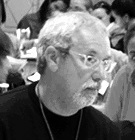By Sam Piha
 |
| Sam Piha |
Helen Janc Malone is Editor in Chief of a new book series entitled Current Issues in Out-of-School Time (OST). Her complete bio is below. Dr. Malone was invited to share her thoughts and lead a small group session at the How Kids Learn VII conference on the future of afterschool. She agreed to answer a few interview questions for this blog post.
A: It was a confluence of events that came together with perfect timing... As my
officers and I were preparing for the 10th anniversary celebration of the American Educational Research Association (AERA) Out-of-School Time Special Interest Group (OST SIG), I began conversations with colleagues about the best ways to bring voices from across the OST field into a conversation about where we are today and where we should be heading as a field. Simultaneously, Information Age Publishing reached out and asked me to create a book series that would serve as a platform to bridge research and practice and to engage the field in a dialogue about salient OST issues.
 |
| Dr. Helen Janc Malone |
The first book in this new series is The Growing Out-of-School Time Field: Past, Present, and Future (2018). The volume is designed to set the foundation for the book series, to address the progress, challenges, and opportunities the field faces, to lift-up broader trends, and to point to possible future paths forward.
This book is a collaboration of 39 scholars, practitioners, and advocates who have dedicated their professional careers to improving research, practices, and policies that support OST. The book is purposely designed to focus on macro trends, to be accessible in content to diverse audiences, and to intentionally push our thinking in new ways, perhaps where we are starting to see emerging work but where we recognize more needs to be done.
The call for ideas for future books in the series is now open through December 15, 2017: http://www.infoagepub.com/series/Current-Issues-in-Out-of-School-Time
A: This book offers a number of questions to help propel the field further forward. They include:
- What are the ways in which the field can continue to balance a developmental lens while also broadening a learning frame?
- What incentive structures and mechanisms should the field invest to attract more professionals of color?
- How do we build career ladders and ongoing professional and leadership development supports for OST staff?
- How do we build and align data systems that are responsive to the young people, families, and practitioners involved?
- How do we create meaningful research-practice partnerships?
- How do we more intentionally engage in an international dialogue and exchange of ideas to strengthen OST?
A: The OST field has benefited over the years from being both malleable and adaptable in its terminology and approach. Whether before- or after-school or summer programs, OST has had a long-standing place as a partner to families, communities, and schools. Decades of research and evaluations have helped us define and refine what do we mean by high-quality programs, what is the impact of high-quality programs on development and learning, and what role does the field play in breaking down equity barriers.
At the same time, as a sub-sector of various dominant sectors (health and human services, education, and labor), OST has had to make an ongoing case for relevance, especially in the policy arena. As we look to the future, there are several themes emerging from the book, including:
- The need to deepen our research into multi-dimensional identities of youth so that we can better serve and support all young people.
- Education policy is returning to the whole child frame, an approach that OST field has long fostered. The field has an opportunity to make its case for OST as a partner in both young people’s learning and holistic development. The increased attention to social-emotional learning is a timely vehicle for communicating this message and utilizing the existing spotlight on SEL to deepen both field research and practice.
- Post-secondary transitions and pathways into workforce are gaining momentum as broadening considerations in education. OST stands to gain by being proactive in exploring transition spaces, with intentional attention to young people who often face systemic and institutional barriers.
- There is an ongoing debate about whether and how should OST professionalize as a field and what does that mean, given the great diversity of programs and contexts that fall under its umbrella. This conversation needs to continue with attention to career ladders and pathways and the meaning and role of youth-serving professionals as a lifelong career.
- While school-community partnerships have a long-standing point of connection for practitioners, research is crossing these spaces only in pockets, with most of the research, professional conferences, and discussions taking place in siloes. Inviting scholars from outside OST stands to enrich the field, broaden connections, and help propel OST in new and innovative ways.
—————
Dr. Helen Janc Malone’s work within OST has been situated at the nexus of research, practice, and network-building. Over the past 15+ years, she has supported adolescent leadership development research and practice, help support the national network of statewide afterschool networks, conducted research at Harvard on OST (while a doctoral student), and served in 2015-16 as the Chair of the American Educational Research Association (AERA) Out-of-School Time Special Interest Group (OST SIG).
At present, Dr. Malone is an adjunct professorial lecturer at American University teaching nonformal education, serves on the editorial board of the Journal of Expanded Learning Opportunities (among other journals in this arena). OST is also an important component of the Institute for Educational Leadership, where she is the director of education policy.






No comments:
Post a Comment